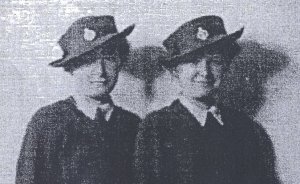Bedfordshire Land Girl Memoir
Bedfordshire Women's Land Army | Land Girl Memoirs
Silsoe Hostel
Betty and Jean Pearson
(WLA 120560 and 120561: 17th May 1943 to 16th February 1946)
 The year 1943 saw us [identical twins, Betty and Jean Pearson, from County Durham] in the uniform of the Women’s Land Army. Green jersey, breeches, knee-length
stockings, brown shoes, shirts, hat and overcoat and working clothes.
The year 1943 saw us [identical twins, Betty and Jean Pearson, from County Durham] in the uniform of the Women’s Land Army. Green jersey, breeches, knee-length
stockings, brown shoes, shirts, hat and overcoat and working clothes.
When we left Birtley station for Bedford, all the family and friends turned out to wave us goodbye. We arrived at Bedford station to be met by an army truck and the first thing we saw were lots of cycles being ridden by school boys in their blazers and straw hats. It was just like ‘Tom Brown’s Schooldays’. After going through some lovely country-side, we eventually arrived at the hostel, which was at Wrest Park Lodge, Silsoe - an old manor.
The girls were from the North-East and Yorkshire, and we soon settled in. Later a batch of girls came in from the South and at first the North and South couldn’t get on, and on one occasion during a meal a row broke out and the pudding plates were thrown around the dining room. Eventually things settled down and we all became friends.
We had to get up at 6am to put our sandwiches up, consisting of grated cheese. The first 2 months we were allocated to various farms, doing threshing, hoeing and planting. I remember we had to go bean-threshing at Woburn Abbey and I had the job of taking the horse and cart to fill it with the bean stalks and then take it into the yard to put in the bullocks’ troughs. What I had forgotten to do was allow for the hubs on the cart on the cart to go through the gates, and they caught the gate and as I went through the gates came away, and the horse took fright and so did the young bullocks, and there was a right ‘how-do-you-do’ – the farmer was far from pleased.
We eventually got settled on a farm called Priestley Farm, which had been a monastery in the past. We were there for the duration of the war, three happy years. The farmer and the farm-hands were all very kind to us, the work was very hard but we were soon knocked into shape. The winter months were extremely trying because we had to pick Brussels sprouts in the snow, soaking wet, hands red and cold, and a few tears were shed, feeling sorry for ourselves.
We often worked with German and Italians prisoners-of-war and our soldiers used to stand in the fields with rifles, guarding them.
The village consisted of a church and two pubs. We were asked if we would like to teach at the Sunday School. We had difficulty understanding the Bedfordians’ dialect and the children couldn’t understand our North-east accent. We had to go to a lovely thatched cottage, where two dear elderly ladies gave us instructions for the Sunday School lessons. After a while, we gave it up, because we used to stay in Bedford at the weekend with some relatives.
We used to have some nice wardens looking after us. Of course we got up to the usual pranks – making apple-pie beds, putting holly into the sheets, etc. We also had our own ghost, which frightened the living daylights out of us. A lady and a little boy ghost used to visit one of the girl’s bedroom and walk up between the beds, door handles used to turn on the bedroom doors and we could hear chairs being moved in the dining room through the night and nobody was there.
When any of the girls was married we would go to the garden shop in the town and borrow hoes and forks and form a guard of honour.
Often we were invited to an American camp for a night out. They had wonderful dance bands and lots of lovely cakes (which we didn’t have). A soldier called George from a camp near us, used to come to our hostel and play the piano for the girls to dance.
A big victory parade was organized in Bedford in February 1946. All the county’s land girl contingents were assembled for Princess Elizabeth I (now Queen Elizabeth II). Betty and I had the honour to present her Royal Highness with a basket of produce in the Corn Exchange – it was a grand day.
We got on very well with all the girls and had a great time. The companionship was something which had to be experienced to be believed. It was a great privilege to serve in the Land Army and one we would not have missed.
Stuart Antrobus Historian/Author
Page last updated: 22nd April 2014

